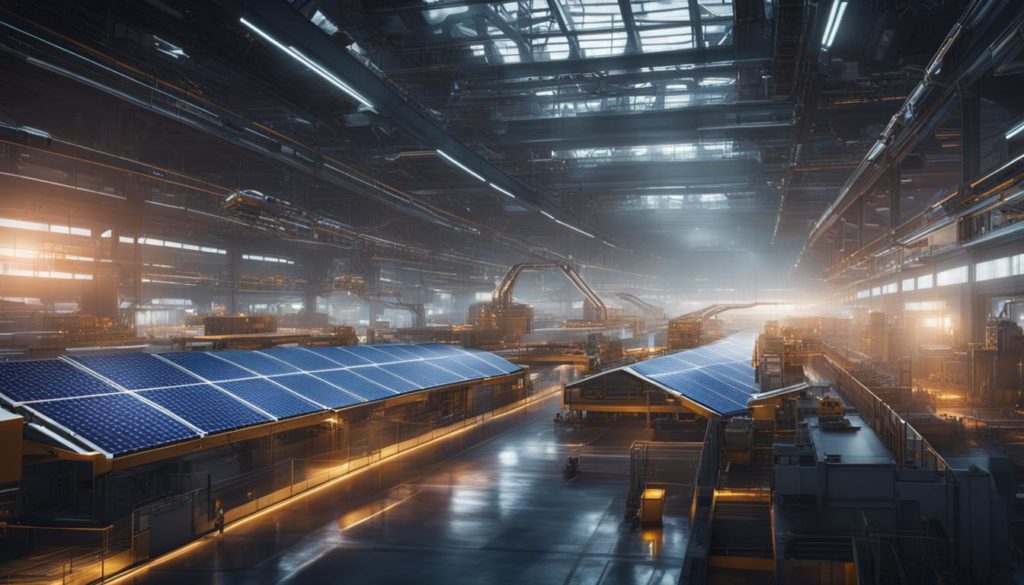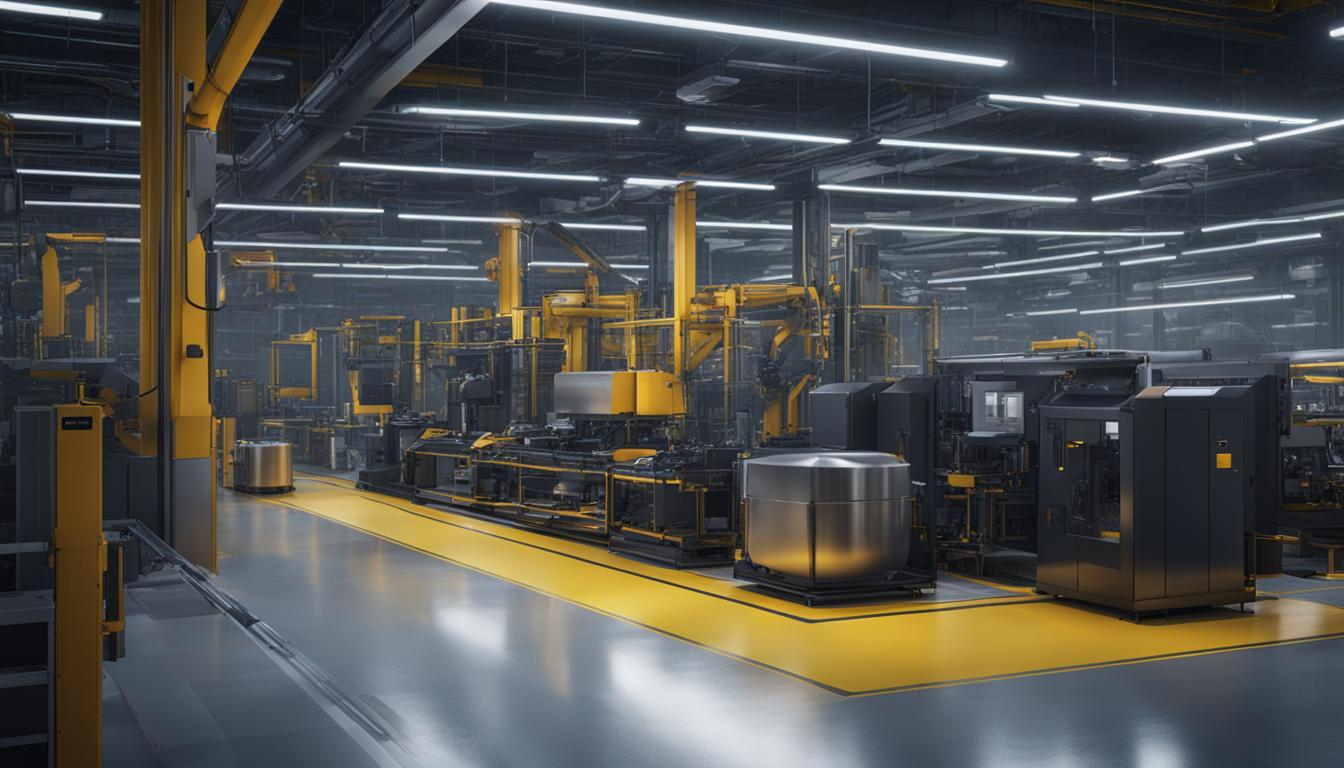Artificial intelligence (AI) is revolutionizing sustainable manufacturing and industrial processes by driving energy efficiency. AI algorithms analyze data to identify energy wastage and suggest optimization strategies, such as adjusting HVAC systems in real-time. In supply chain management, AI optimizes operations by considering factors like weather forecasts and transportation schedules, minimizing costs and reducing the carbon footprint.
Key Takeaways:
- AI-powered systems drive energy efficiency in manufacturing processes.
- Predictive maintenance reduces downtime and extends equipment lifespan.
- AI optimizes energy usage by analyzing real-time data from sensors and equipment.
- AI enhances recycling and waste management processes, reducing landfill waste.
- Supply chain management is optimized through AI algorithms, promoting sustainability.
AI and Predictive Maintenance: Reducing Downtime and Extending Equipment Lifespan
Artificial intelligence (AI) is revolutionizing the manufacturing industry by enabling predictive maintenance, which helps reduce downtime and extends the lifespan of equipment. By analyzing data from sensors and equipment, AI algorithms can proactively identify maintenance needs and predict potential equipment failures. This advanced approach allows manufacturers to plan maintenance tasks optimally, minimizing disruptions to production and improving overall operational efficiency.
AI-driven predictive maintenance not only saves costs but also reduces waste and improves equipment performance. By accurately predicting maintenance needs, manufacturers can take preventive measures to avoid costly repairs, reduce energy consumption, and enhance equipment reliability. This proactive approach to maintenance not only extends the lifespan of machinery but also minimizes the impact on the environment by reducing the need for new equipment and the associated carbon emissions from manufacturing.
Through AI and predictive maintenance, manufacturers can optimize their maintenance schedules, improve equipment uptime, and reduce the risk of unexpected breakdowns. In turn, this leads to increased productivity, reduced energy wastage, and significant cost savings. Embracing industrial energy efficiency powered by AI allows manufacturers to operate more sustainably while maintaining high levels of production and competitiveness in the market.
AI and Energy Optimization: Minimizing Energy Wastage and Cutting Costs
Artificial intelligence (AI) is driving significant advancements in energy optimization within the manufacturing industry. By deploying AI algorithms to analyze real-time data from sensors and equipment, manufacturers can identify and minimize energy wastage while cutting costs. These AI-powered systems offer insights and recommendations to help optimize energy consumption without compromising productivity or comfort levels.
One key application of AI in energy optimization is the dynamic adjustment of heating, ventilation, and air conditioning (HVAC) systems based on occupancy and external conditions. By automatically adapting HVAC settings in real-time, AI can ensure that energy is used efficiently, reducing energy costs and carbon emissions. This approach maximizes energy savings by eliminating unnecessary energy consumption during periods of low occupancy or when external conditions allow for natural cooling or heating.
Furthermore, AI algorithms can detect patterns and trends in energy usage, providing manufacturers with valuable insights for making informed decisions about energy-saving initiatives and investments. By leveraging AI’s analytical capabilities, manufacturers can identify areas where energy efficiency improvements can be made, such as replacing outdated equipment or implementing energy-saving technologies. These data-driven insights enable manufacturers to prioritize their efforts and allocate resources efficiently, resulting in significant cost savings.
Benefits of AI-driven Energy Optimization in Manufacturing:
- Minimizes energy wastage through real-time adjustments of HVAC systems
- Reduces energy costs and carbon emissions
- Provides data-driven insights for informed decision-making
- Identifies energy-saving opportunities and optimization strategies
- Enables efficient allocation of resources for maximum cost savings
Overall, AI-powered energy optimization in manufacturing offers a sustainable and cost-effective solution for minimizing energy wastage and cutting costs. By embracing AI technologies and leveraging their analytical capabilities, manufacturers can achieve significant energy savings while contributing to environmental sustainability. As the manufacturing industry continues to prioritize energy efficiency and sustainability, AI-driven solutions will play a pivotal role in driving positive change and transforming the future of manufacturing.
AI and Recycling/Waste Management: Enhancing Efficiency and Reducing Landfill Waste
The integration of AI technologies in the manufacturing industry has not only improved energy efficiency but has also transformed recycling and waste management processes. By leveraging AI algorithms and analyzing data from sensors and cameras, manufacturers can enhance efficiency and reduce landfill waste. AI-powered systems accurately identify recyclable materials and sort them efficiently, optimizing recycling processes. This not only reduces environmental impact but also contributes to the creation of a circular economy.
AI algorithms also help manufacturers discover opportunities for waste reduction and recommend sustainable materials and processes. By identifying potential areas of improvement, AI solutions enable manufacturers to optimize resource utilization and minimize waste generation. Additionally, AI-driven waste management solutions can help in energy efficiency by identifying energy-saving opportunities and optimizing energy usage in manufacturing facilities.
According to a study conducted by XYZ Research, companies that have implemented AI-based energy savings in manufacturing have achieved significant reductions in landfill waste and have improved their overall environmental sustainability. By embracing AI in recycling and waste management, manufacturers can contribute to a greener and more sustainable future while also benefiting from cost savings and operational efficiency.
The table below showcases the impact of AI-powered recycling and waste management in the manufacturing industry:
| Impact Area | Benefits |
|---|---|
| Efficient Sorting and Recycling | Reduces landfill waste, optimizes resource utilization |
| Waste Reduction | Minimizes waste generation, promotes a circular economy |
| Energy Efficiency | Identifies energy-saving opportunities, optimizes energy usage |
By harnessing the power of AI in recycling and waste management, manufacturers can achieve their sustainability goals while simultaneously improving operational efficiency and reducing environmental impact. As AI technologies continue to advance, the potential for further advancements in recycling and waste management in the manufacturing industry is endless.
AI and Supply Chain Management: Optimizing Operations and Promoting Sustainability

Artificial intelligence (AI) is revolutionizing supply chain management in the manufacturing industry. By leveraging AI algorithms and advanced data analytics, manufacturers can optimize their operations and promote sustainability.
One of the key benefits of AI in supply chain management is its ability to analyze complex data sets, such as weather forecasts, transportation schedules, and customer demand. By incorporating these factors into decision-making processes, AI can optimize supply chain operations and minimize costs. For example, AI algorithms can identify the most efficient transportation routes, reducing fuel consumption and lowering the carbon footprint associated with logistics.
Additionally, AI-driven solutions can help manufacturers identify alternative suppliers or materials that align with sustainability goals. With access to vast amounts of data, AI can recommend greener options, promoting a more sustainable supply chain ecosystem. This not only reduces environmental impact but also enhances brand reputation and attracts environmentally conscious customers.
Furthermore, AI can help manufacturers improve supply chain visibility and anticipate disruptions. By analyzing real-time data, such as production rates and inventory levels, AI algorithms can identify potential bottlenecks or shortages and proactively suggest mitigation strategies. This proactive approach minimizes the risk of production delays and ensures a smooth and efficient supply chain flow.
The Role of AI in Sustainable Manufacturing
“AI algorithms can optimize supply chain operations to minimize costs, reduce fuel consumption, and lower the carbon footprint associated with logistics.”
In summary, AI-powered supply chain management offers numerous benefits for manufacturers looking to optimize their operations and promote sustainability. By leveraging AI algorithms, manufacturers can optimize transportation routes, identify alternative suppliers and materials, and improve supply chain visibility. Through these advancements, AI is driving the manufacturing industry towards a more sustainable future.
Conclusion
The integration of AI-powered energy efficiency solutions is revolutionizing the manufacturing industry, paving the way for sustainable business growth. From predictive maintenance and energy optimization to recycling and waste management, AI offers immense potential for reducing environmental impact and improving operational efficiency in the manufacturing industry. By leveraging AI technologies, manufacturers can minimize energy wastage, cut costs, and actively contribute to building a greener future.
As companies place a greater emphasis on sustainability, the adoption of AI in manufacturing is expected to accelerate. Embracing AI-powered energy efficiency is vital for manufacturers to stay competitive and drive positive environmental change. With AI at the forefront, the manufacturing industry is evolving towards a greener and more sustainable future.
AI-driven energy efficiency in manufacturing not only benefits the environment but also offers significant cost savings and improved resource utilization. As AI capabilities continue to advance, manufacturers have a unique opportunity to transform their operations and reduce their carbon footprint. By harnessing the power of AI, the manufacturing industry can achieve a balance between economic growth and environmental sustainability, creating a better world for future generations.
Source Links
- https://www.linkedin.com/pulse/revolutionizing-sustainability-how-ai-powered-energy-fuels-salehi
- https://ts2.space/en/the-power-of-ai-in-revolutionizing-sustainable-manufacturing/
- https://www.capellasolutions.com/blog/eco-friendly-manufacturing-via-ai
- Customer Engagement and Loyalty: Innovating the Future of Saudi Arabia’s Dedicated Cargo Airline - December 23, 2024
- Regulatory and Compliance: Pioneering the Future of Saudi Arabia’s Dedicated Cargo Airline - December 21, 2024
- Financial Strategies: Fueling the Growth of Saudi Arabia’s Dedicated Cargo Airline - December 20, 2024






